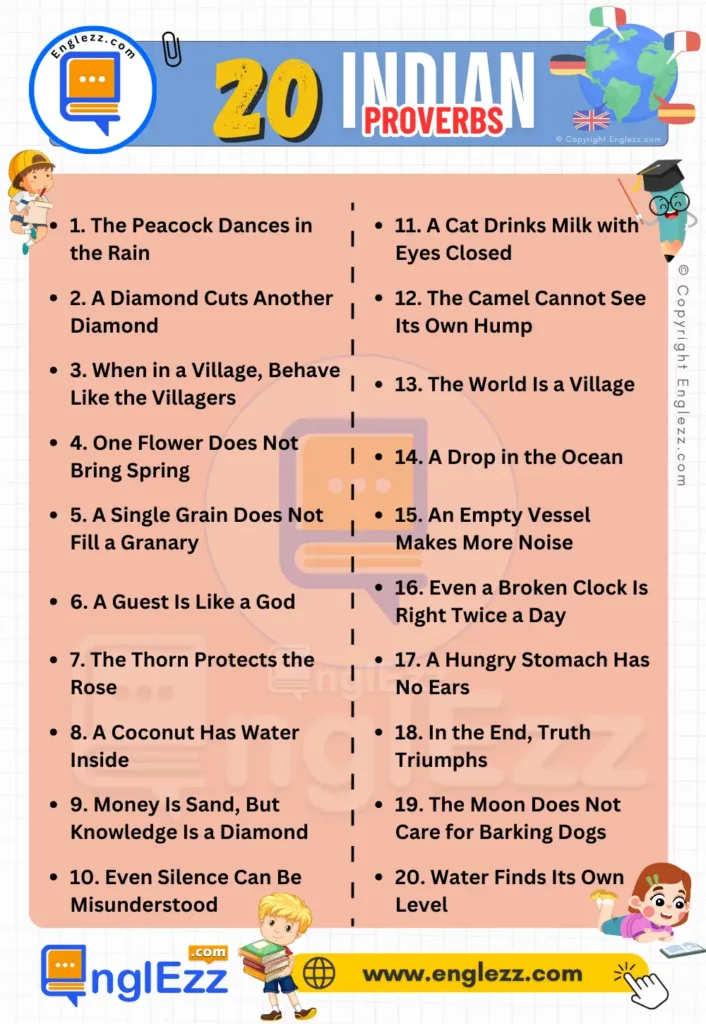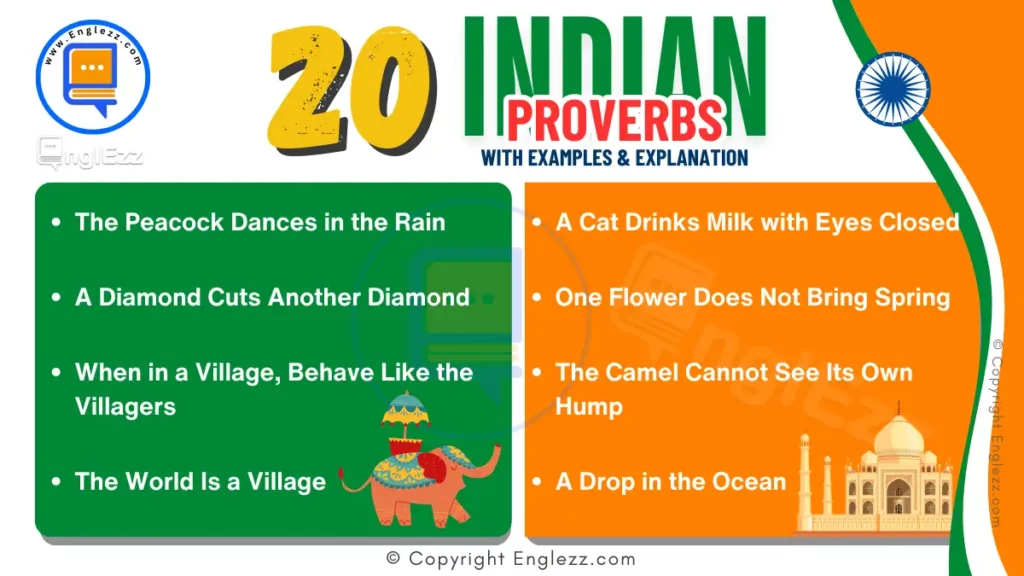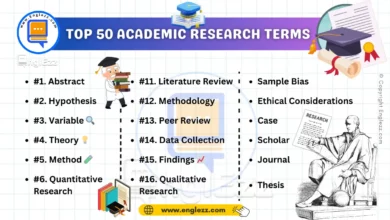Proverbs are the distilled essence of a culture’s wisdom, often conveying profound truths in a few words. India, with its diverse linguistic and cultural heritage, has a treasure trove of proverbs that reflect its rich traditions, values, and philosophies. In this post, we explore 20 originally Indian proverbs in English, providing you with a glimpse into the deep well of Indian thought.
These sayings, rooted in ancient wisdom, have been passed down through generations, offering insights into life, relationships, and society.
Table of Contents
- Famous 20 Indian Proverbs in English with Examples and Explanations
- #1. “The Peacock Dances in the Rain” 🦚
- #2. “A Diamond Cuts Another Diamond” 💎
- #3. “When in a Village, Behave Like the Villagers” 🏘️
- #4. “One Flower Does Not Bring Spring” 🌸
- #5. “A Single Grain Does Not Fill a Granary” 🌾
- #6. “A Guest Is Like a God” 🙏
- #7. “The Thorn Protects the Rose” 🌹
- #8. “A Coconut Has Water Inside” 🥥
- #9. “Money Is Sand, But Knowledge Is a Diamond” 💰💎
- #10. “Even Silence Can Be Misunderstood” 🤐
- #11. “A Cat Drinks Milk with Eyes Closed” 🐱🥛
- #12. “The Camel Cannot See Its Own Hump” 🐪
- #13. “The World Is a Village” 🌍
- #14. “A Drop in the Ocean” 🌊
- #15. “An Empty Vessel Makes More Noise” 🍲
- #16. “Even a Broken Clock Is Right Twice a Day” ⏰
- #17. “A Hungry Stomach Has No Ears” 🍽️
- #18. “In the End, Truth Triumphs” ⚖️
- #19. “The Moon Does Not Care for Barking Dogs” 🌕🐕
- #20. “Water Finds Its Own Level” 🌊
- Indian Proverbs in English Table
- Indian Proverbs in English Printable
- Conclusion
Famous 20 Indian Proverbs in English with Examples and Explanations
Each proverb is accompanied by its original version in the native language, a phonetic transcription, and an explanation of its meaning. To make these proverbs more relatable, we also offer examples of how they can be used in everyday conversations.
Whether you’re a language enthusiast, a traveler, or someone interested in cultural studies, these proverbs will enrich your understanding of Indian culture and its universal truths. So, let’s embark on a journey of wisdom that transcends borders and languages.
#1. “The Peacock Dances in the Rain” 🦚
Original Proverb: मोर नाचता है बारिश में।
Language: Hindi
Phonetic Transcription: “Mor nachta hai barish mein.”
Explanation: This proverb highlights the joy and beauty found in natural occurrences. It suggests that happiness can often be found in simple, natural events if one is receptive to it.
Examples:
- When the first snowfall came, she danced like a peacock in the rain.
- After a long week, a quiet evening at home made him feel like the peacock dancing in the rain.
#2. “A Diamond Cuts Another Diamond” 💎
Original Proverb: हीरा हीरे को काटता है।
Language: Hindi
Phonetic Transcription: “Heera heere ko kaatta hai.”
Explanation: This proverb suggests that only someone with equal strength or skill can challenge another. It’s often used to describe a situation where two equally powerful forces are in opposition.
Examples:
- In the court, two top lawyers battled it out, proving that only a diamond cuts another diamond.
- In chess, he finally met his match; it was a game where a diamond cuts another diamond.
#3. “When in a Village, Behave Like the Villagers” 🏘️
Original Proverb: जैसी बस्ती वैसा वेश।
Language: Hindi
Phonetic Transcription: “Jaisi basti, vaisa vesh.”
Explanation: This proverb emphasizes the importance of adapting to your surroundings and respecting local customs when in a new place.
Examples:
- She quickly learned that when traveling, it’s best to behave like the villagers.
- In the new office, he decided to adapt quickly, remembering the saying, “When in a village, behave like the villagers.”
#4. “One Flower Does Not Bring Spring” 🌸
Original Proverb: एक फूल से बाग़ नहीं बनता।
Language: Hindi
Phonetic Transcription: “Ek phool se bagh nahi banta.”
Explanation: This proverb conveys that a single effort or small action is often insufficient to bring about significant change or success.
Examples:
- She knew that one successful project wasn’t enough, as one flower does not bring spring.
- The initial victory was sweet, but he remembered that one flower does not bring spring.

#5. “A Single Grain Does Not Fill a Granary” 🌾
Original Proverb: एक दाना नहीं भरे कोठार।
Language: Bengali
Phonetic Transcription: “Ek dana nei bhore kothar.”
Explanation: Similar to the previous one, this proverb suggests that cumulative efforts are necessary for achieving substantial results.
Examples:
- He knew that consistency was key, as a single grain does not fill a granary.
- She worked on her project every day, understanding that a single grain does not fill a granary.
#6. “A Guest Is Like a God” 🙏
Original Proverb: अतिथि देवो भवः।
Language: Sanskrit
Phonetic Transcription: “Atithi devo bhavah.”
Explanation: This ancient proverb underscores the importance of hospitality in Indian culture, where guests are treated with the utmost respect and care.
Examples:
- They prepared a feast, remembering that a guest is like a god.
- Even when unexpected visitors arrived, they were treated with respect because a guest is like a god.
#7. “The Thorn Protects the Rose” 🌹
Original Proverb: कांटा गुलाब की रक्षा करता है।
Language: Hindi
Phonetic Transcription: “Kaanta gulaab ki raksha karta hai.”
Explanation: This proverb signifies that often, the things we consider unpleasant or difficult (like thorns) play a crucial role in protecting or enhancing something valuable (like a rose).
Examples:
- She understood that the criticism she received was like the thorn protecting the rose.
- His strict discipline was hard to bear, but it was the thorn that protected the rose.
#8. “A Coconut Has Water Inside” 🥥
Original Proverb: नारियल के भीतर पानी होता है।
Language: Hindi
Phonetic Transcription: “Nariyal ke bheetar paani hota hai.”
Explanation: This proverb indicates that appearances can be deceiving. Just as a coconut is hard on the outside but has water inside, people or situations may have hidden qualities or value.
Examples:
- She seemed tough, but those who knew her understood that a coconut has water inside.
- He was intimidating at first, but they soon realized that a coconut has water inside.
#9. “Money Is Sand, But Knowledge Is a Diamond” 💰💎
Original Proverb: पैसा रेत है, ज्ञान हीरा।
Language: Marathi
Phonetic Transcription: “Paisa ret aahe, gyaan hira.”
Explanation: This proverb emphasizes that while money is transient and can be lost, knowledge is valuable and lasts forever.
Examples:
- He invested in education, believing that money is sand, but knowledge is a diamond.
- She prioritized learning over earning because she knew that money is sand, but knowledge is a diamond.
#10. “Even Silence Can Be Misunderstood” 🤐
Original Proverb: मौन भी गलत समझा जा सकता है।
Language: Hindi
Phonetic Transcription: “Maun bhi galat samjha ja sakta hai.”
Explanation: This proverb cautions that remaining silent can sometimes lead to misunderstandings, as people may interpret silence in various ways.
Examples:
- He chose his words carefully, aware that even silence can be misunderstood.
- In the meeting, she decided to speak up, knowing that even silence can be misunderstood.
#11. “A Cat Drinks Milk with Eyes Closed” 🐱🥛
Original Proverb: बिल्ली आंखें बंद करके दूध पीती है।
Language: Hindi
Phonetic Transcription: “Billi aankhen band karke doodh peeti hai.”
Explanation: This proverb refers to the tendency of ignoring the consequences of one’s actions. Like a cat closing its eyes while drinking milk, people sometimes refuse to see the bigger picture.
Examples:
- Ignoring the risks, he proceeded with the deal, like a cat drinking milk with its eyes closed.
- She knew she was in denial, behaving like a cat drinking milk with its eyes closed.
#12. “The Camel Cannot See Its Own Hump” 🐪
Original Proverb: ऊंट को अपनी पीठ नहीं दिखती।
Language: Hindi
Phonetic Transcription: “Oont ko apni peeth nahi dikhti.”
Explanation: This proverb points out the irony of how people often fail to recognize their own faults or shortcomings while easily noticing others’.
Examples:
- He criticized everyone but forgot the camel cannot see its own hump.
- She realized she was judging others without introspection, much like a camel that cannot see its own hump.
#13. “The World Is a Village” 🌍
Original Proverb: दुनिया एक गाँव है।
Language: Hindi
Phonetic Transcription: “Duniya ek gaon hai.”
Explanation: This proverb reflects the idea that the world is interconnected and that what happens in one part can affect another, much like the dynamics in a small village.
Examples:
- With technology shrinking distances, he often said that the world is a village.
- In the age of social media, she realized how true it is that the world is a village.
#14. “A Drop in the Ocean” 🌊
Original Proverb: सागर में एक बूंद।
Language: Hindi
Phonetic Transcription: “Sagar mein ek boond.”
Explanation: This proverb expresses the idea that an individual or small action may seem insignificant in the vastness of the world, like a drop in the ocean.
Examples:
- He knew his donation was just a drop in the ocean, but it was still worth doing.
- Her efforts felt tiny, but she reminded herself that even a drop in the ocean contributes.
#15. “An Empty Vessel Makes More Noise” 🍲
Original Proverb: खाली बर्तन ज्यादा आवाज करता है।
Language: Hindi
Phonetic Transcription: “Khaali bartan zyada awaaz karta hai.”
Explanation: This proverb suggests that those who have the least substance or knowledge often make the most noise or boast the most.
Examples:
- He ignored the loud complaints, knowing that an empty vessel makes more noise.
- In debates, she often found that those who talked the most had the least to say, like an empty vessel making more noise.
#16. “Even a Broken Clock Is Right Twice a Day” ⏰
Original Proverb: टूटी घड़ी भी दिन में दो बार सही समय दिखाती है।
Language: Hindi
Phonetic Transcription: “Tooti ghadi bhi din mein do baar sahi samay dikhati hai.”
Explanation: This proverb indicates that even those who are usually wrong or unreliable can occasionally be correct, just like a broken clock.
Examples:
- She trusted her instincts but remembered that even a broken clock is right twice a day.
- He was surprised by the outcome, though he knew that even a broken clock is right twice a day.
#17. “A Hungry Stomach Has No Ears” 🍽️
Original Proverb: भूखे पेट के कान नहीं होते।
Language: Hindi
Phonetic Transcription: “Bhookhe pet ke kaan nahi hote.”
Explanation: This proverb emphasizes that physical needs, especially hunger, take precedence over all other concerns or arguments.
Examples:
- They stopped debating and decided to eat, realizing that a hungry stomach has no ears.
- When she noticed everyone’s irritation, she remembered that a hungry stomach has no ears.
#18. “In the End, Truth Triumphs” ⚖️
Original Proverb: सत्यमेव जयते।
Language: Sanskrit
Phonetic Transcription: “Satyameva jayate.”
Explanation: This ancient proverb means that ultimately, truth prevails, even if it takes time.
Examples:
- He remained honest, believing that in the end, truth triumphs.
- Despite the challenges, she was comforted by the thought that truth triumphs in the end.
#19. “The Moon Does Not Care for Barking Dogs” 🌕🐕
Original Proverb: चाँद कुत्तों की परवाह नहीं करता।
Language: Hindi
Phonetic Transcription: “Chaand kutto ki parwah nahi karta.”
Explanation: This proverb suggests that those who are above others, like the moon, should not be concerned with petty criticisms or gossip.
Examples:
- He ignored the rumors, knowing that the moon does not care for barking dogs.
- She stayed focused on her goals, like the moon that does not care for barking dogs.
#20. “Water Finds Its Own Level” 🌊
Original Proverb: पानी अपने स्तर पर आता है।
Language: Hindi
Phonetic Transcription: “Paani apne star par aata hai.”
Explanation: This proverb suggests that things naturally find their place or balance, just as water seeks its own level.
Examples:
- In time, he knew that everything would settle, as water finds its own level.
- She trusted that things would work out, remembering that water finds its own level.
Indian Proverbs in English Table
| 1. The Peacock Dances in the Rain 🦚 | 11. A Cat Drinks Milk with Eyes Closed 🐱🥛 |
| 2. A Diamond Cuts Another Diamond 💎 | 12. The Camel Cannot See Its Own Hump 🐪 |
| 3. When in a Village, Behave Like the Villagers 🏘️ | 13. The World Is a Village 🌍 |
| 4. One Flower Does Not Bring Spring 🌸 | 14. A Drop in the Ocean 🌊 |
| 5. A Single Grain Does Not Fill a Granary 🌾 | 15. An Empty Vessel Makes More Noise 🍲 |
| 6. A Guest Is Like a God 🙏 | 16. Even a Broken Clock Is Right Twice a Day ⏰ |
| 7. The Thorn Protects the Rose 🌹 | 17. A Hungry Stomach Has No Ears 🍽️ |
| 8. A Coconut Has Water Inside 🥥 | 18. In the End, Truth Triumphs ⚖️ |
| 9. Money Is Sand, But Knowledge Is a Diamond 💰💎 | 19. The Moon Does Not Care for Barking Dogs 🌕🐕 |
| 10. Even Silence Can Be Misunderstood 🤐 | 20. Water Finds Its Own Level 🌊 |
Indian Proverbs in English Printable

Conclusion
Proverbs are more than just sayings; they are reflections of the collective wisdom of a culture. The 20 Indian proverbs we explored in this post offer valuable insights into the Indian way of thinking, highlighting the importance of community, nature, and moral integrity.
These proverbs, though originating in India, resonate with universal truths, making them relevant to people across the globe. By understanding and using these proverbs in your daily life, you can not only enrich your language but also gain a deeper appreciation of Indian culture.
Whether you’re learning a new language, studying different cultures, or simply looking for some timeless wisdom, these proverbs serve as a bridge between worlds. They remind us that despite our differences, certain truths and values are shared across humanity.
As you incorporate these proverbs into your conversations, remember that each one carries centuries of wisdom, waiting to be passed on to the next generation.
So, let these words of wisdom guide you, inspire you, and connect you to the rich tapestry of Indian culture.









🌟 Dive into the wisdom of Indian culture with these timeless proverbs translated into English. Discover how they reflect universal truths and enrich your daily conversations. Don’t miss out! 👉 Follow and like EnglEzz for more insights! 🌐✨
https://www.englezz.com/20-indian-proverbs-in-english/
.
#englezz #languagelearning #proverbs #culturalwisdom #IndianProverbs #learnEnglish #inspiration